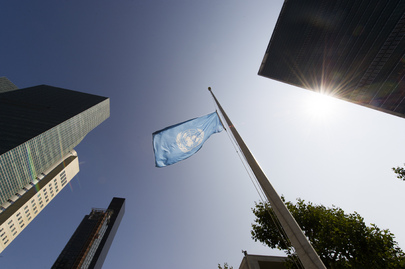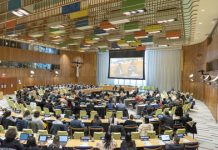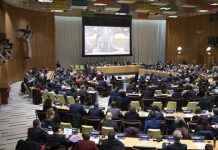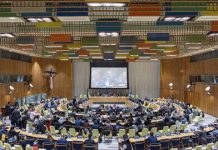From providing emergency care and evacuation support, to repairing bombed energy plants, UN humanitarian workers are delivering despite reduced resources, an expanding frontline and direct attacks on their colleagues.
The widespread use of drones and glide bombs in the Ukraine war means that a large swath of the country is directly exposed to Russian strikes, further complicating the work of the UN Office for the Coordination of Humanitarian Affairs (OCHA), which is preparing for the famously harsh Ukrainian winter.
UN News spoke to Andrea de Domenico, OCHA’s Ukraine country chief, about the challenges he and his colleagues are dealing and how they cope with working under fire.
Andrea de Domenico: Our resources are shrinking, so we have to make tough choices. We have identified some specific priorities, such as frontline response, evacuation support, and humanitarian aid for displaced people.
We’re focused this year primarily on those living along the frontline, most of whom are vulnerable, elderly people with limited mobility who need support.
On top of that, we have to respond to attacks on energy infrastructure, which is a big challenge. In the last week, for example, 60 percent of gas production has been damaged. If you take away water and electricity, surviving winter will be very, very difficult.
With support from the centre in Chișinău, Moldova, an elderly Ukrainian is learning new ways to navigate the challenges of displacement.
UN News: How much do you need to help those in need, and how much have you received?
Specifically for winter we have asked for $277 million and roughly 50 per cent of that has been mobilized, so there is still a long way to go in order to hit the overall target.
Unfortunately, if we don’t reach that figure it means that people will not be able to spend winter in their homes and will have to be evacuated.
UN News: Last week a UN convoy was shelled. How does your team cope with the psychological pressure of working in such conditions?
The vast majority of humanitarian assistance on the frontline is provided by local authorities and local partners, and we should recognise the fantastic work that they do day in, day out.
They have been exposed to these types of attacks over and over again. This year alone, we have recorded more than 100 incidents.
There have been attacks in which we were collateral damage, but this is the first direct attack on a United Nations humanitarian convoy. Of course, it’s shocking.
After it happened, I said to the team that this is one of the risks that we have to deal with. Our UN security colleagues worked excellently with us and were very effective in protecting the life of those involved in that mission.
It takes a lot of determination, courage and motivation to keep on doing it, but that’s what it is, to be involved in humanitarian operations in a war zone.
Source of original article: United Nations (news.un.org). Photo credit: UN. The content of this article does not necessarily reflect the views or opinion of Global Diaspora News (www.globaldiasporanews.net).
To submit your press release: (https://www.globaldiasporanews.com/pr).
To advertise on Global Diaspora News: (www.globaldiasporanews.com/ads).
Sign up to Global Diaspora News newsletter (https://www.globaldiasporanews.com/newsletter/) to start receiving updates and opportunities directly in your email inbox for free.




























